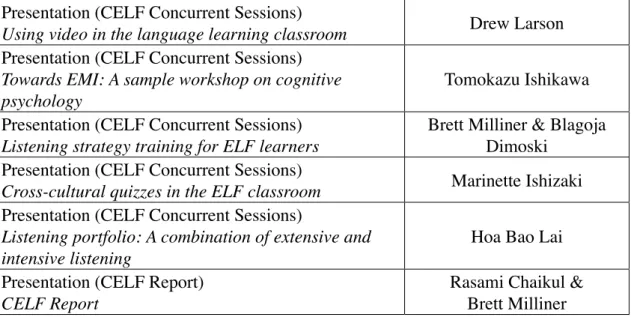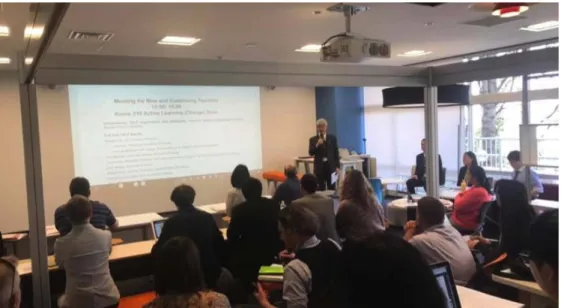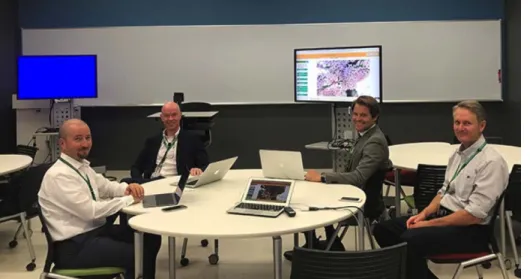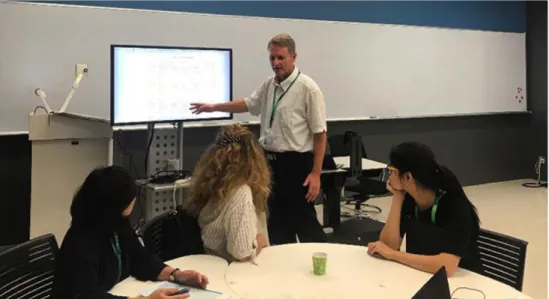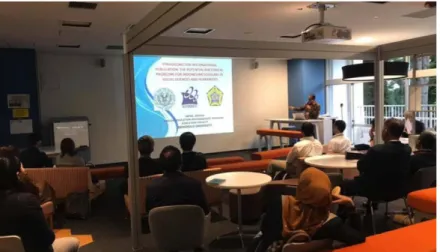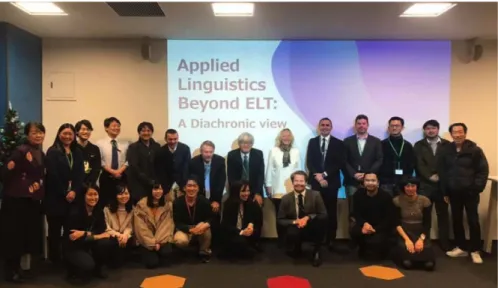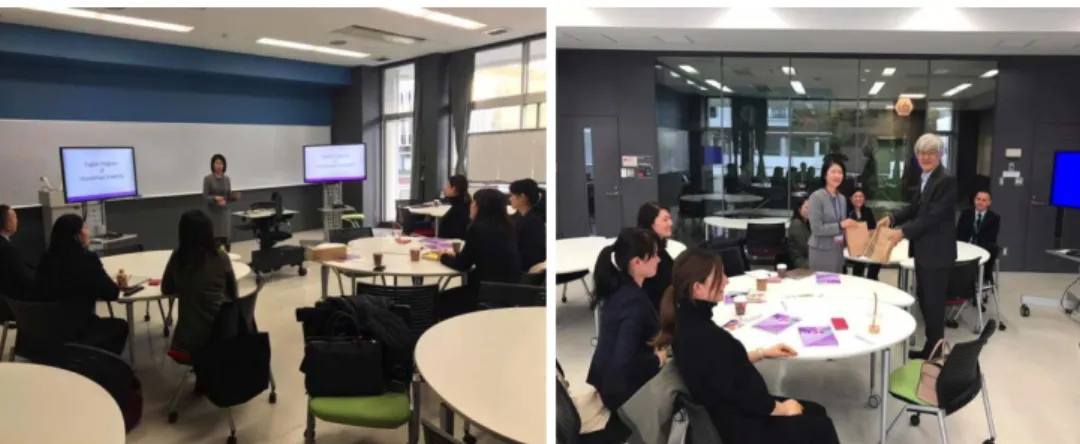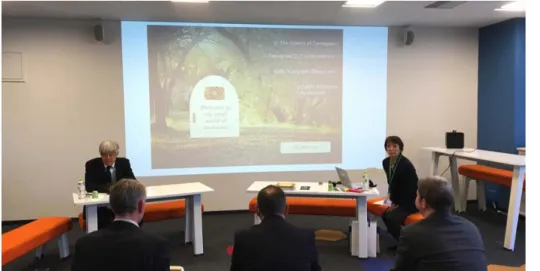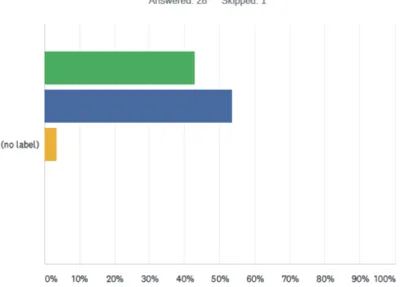A Report on Faculty Development and Research at
the Center for English as a Lingua Franca 2019
ELF センター 2019 FDと研究活動レポート
Rasami Chaikul, ラサミ・チャイクルCenter for English as a Lingua Franca, Tamagawa University, Japan rasami.chaikul@lab.tamagawa.ac.jp
Brett Milliner, ミリナー・ブレット
Center for English as a Lingua Franca, Tamagawa University, Japan milliner@lit.tamagawa.ac.jp
ABSTRACT
The Center for English as a Lingua Franca (CELF) at Tamagawa University is a unique program whereby 56 teachers from diverse backgrounds enrich a learning environment where students can experience the use of English as a Lingua Franca. CELF Faculty Development (FD) aims to promote a better understanding of ELF in ELT, reinforce effective teaching methodologies, support teachers’ professional development and promote inclusion in its diversity. Throughout the 2019 academic year, 21 FD workshops, lectures, discussions and special events on 38 occasions were held in the Spring and Fall semester. In this report, we describe in detail our faculty development activities, present the research achievements of our faculty members, and reveal the results from a FD survey of CELF faculty.
KEYWORDS: English as a lingua franca, ELF, Faculty development, Teacher development, ELF research
1. INTRODUCTION
The Center for English as a Lingua Franca (CELF) provides English as a Lingua Franca (ELF) classes as a required ‘foreign’ language course to all students at Tamagawa University. In the 2019 academic year, we offer ELF classes to more than 2000 students from all colleges at our university. Regardless of geographical background, the number of non-native speakers of English who use English as an international lingua franca around the globe outnumber native speakers. It is therefore crucial that 21st century citizens understand and be aware of the use of English as a lingua franca.
At our ELF Center, approximately 56 qualified teachers from diverse countries of origin (Australia, Brazil, Bulgaria, Canada, China, Egypt, Finland, France, Germany, India, Ireland, Macedonia, New Zealand, Philippines, Poland, Russia, Thailand, UK, USA,
and Vietnam) and native languages were hired by virtue of their teaching qualifications and professional experience. The linguistic and cultural diversity these teachers bring is a valuable resource to enhance our students' awareness of ELF. The main purpose of the various types of CELF Faculty Development (FD) activities is to enhance the understanding and awareness of ELF teaching, assessment and classroom management while providing a platform for our teachers to share ideas, methodologies and research, promote professional development, and strengthen professional networks. In 2019, CELF held 21 FD lectures, workshops, demonstrations and discussions. In the following sections, we report on our FD and professional development initiatives as well as the academic achievements of CELF.
1. THE 2019 CELF-ELTAMA FORUM FOR ENGLISH LANGUAGE TEACHING The 2019 CELF-ELTama Forum for English Language Teaching was a collaborative effort between CELF and ELTama and was held on Friday 23 August, 2019.
The event offered a rich opportunity for CELF teachers to present and discuss their ELF-aware classroom practices, ELF-related research and methodologies, along with current students and alumni from the Graduate School of Humanities who share their English teaching techniques, research and expertise. A total of 11 presentations and reports were given by CELF faculty and part-time teachers (details, see Table 1 below). This reciprocal event attracted approximately 80 participants.
Table 1
CELF talks at the 2019 CELF-ELTama Forum for English Language Teaching
Type of Talk & Title Author(s) Presentation (CELF Research Report)
Epistemological division in writing pedagogy:
ELF-awareness militates against conduit ideology Paul McBride
Presentation (CELF Research Report)
Designing inquiry-based materials to raise
ELF-informed glocal awareness beyond 21st century skills Yuri Jody Yujobo
Presentation (CELF Research Report)
Conforming to native speaker norms? An initial investigation of Japanese learners’ communicative capability in ELF interactions
Blagoja Dimoski, Rasami Chaikul, Yuri Jody Yujobo
& Tricia Okada Presentation (CELF Research Report)
Accommodating the construction of request turn to the timing of compliance: In case of an immediate request in Japanese service encounters
Satomi Kuroshima Presentation (CELF Concurrent Sessions)
Effectiveness of explicit instruction in reading
Presentation (CELF Concurrent Sessions)
Using video in the language learning classroom Drew Larson
Presentation (CELF Concurrent Sessions)
Towards EMI: A sample workshop on cognitive
psychology Tomokazu Ishikawa
Presentation (CELF Concurrent Sessions)
Listening strategy training for ELF learners Brett Milliner & Blagoja Dimoski Presentation (CELF Concurrent Sessions)
Cross-cultural quizzes in the ELF classroom Marinette Ishizaki
Presentation (CELF Concurrent Sessions)
Listening portfolio: A combination of extensive and
intensive listening Hoa Bao Lai
Presentation (CELF Report)
CELF Report Rasami Chaikul &Brett Milliner
Following a short introductory talk by Dr. Tomokazu Ishikawa, the featured plenary invited speaker, Dr. Will Baker (University of Southampton) gave a presentation on “Global Englishes and transcultural communication: Rethinking competences and pedagogy for ELT” and a workshop on “Exploring interculturality and transcultural communication in ELT practices” via video conference. The successful workshop was led by Dr. Ayako Suzuki and Dr. Ishikawa. This joint plenary was co-sponsored by Dr. Ishikawa’ s JSPS Kakenhi Grant (No.19K20794) and supported by JACET ELF SIG.
2. ELF WORKSHOPS & TRAINING FOR CELF TEACHERS
CELF Faculty Development (FD) staged various teacher’s Professional Development (PD) and FD events for CELF teachers and administrative staff throughout the academic year. Most CELF FD workshops, lectures and training sessions were held at least twice each month to encourage teachers to engage in professional development. Most events were held at the end of the teaching day, while others took place during the teachers’ lunch break. A short report on each type of event is provided below.
2.1 CELF Teacher Orientation
The CELF carried out Teacher Orientations each semester. In 2019 these orientations were held on March 25 in the Spring and September 17 in the Fall semester. In each teacher orientation a general briefing on the ELF program, the textbooks and materials used in the program, the CELF Tutor Service, class management, and technology orientation were provided in the morning session. The afternoon session focussed on: a program description, explanations about the academic calendar, faculty development, important information on class management and grading, extensive reading, the orientation of ELF students, and a campus tour.
Figure 2. Dr. Masaki Oda, CELF Director, delivers a welcome speech at the CELF teacher orientation on March 25, 2019
2.2 M-reader and Extensive Reading FD Workshop
The Center for English as a Lingua Franca (CELF) opened its very first Faculty Development (FD) of the 2019 academic year with an M-reader workshop on April 17 and 19. This was a hands-on event aimed at helping teachers use the M-reader program to keep a record of their students’ extensive reading.
2.3 Blackboard CMS Training
implemented and hosts all of CELF teaching resources and administrative information. To help CELF faculty to actively use this learning portal, CELF FD held four Blackboard training sessions twice each semester on April 22- 23 in the Spring and October 15-16 in the Fall. Each workshop focused on managing classroom assignments, assessing students’ performance, and computer assisted learning.
Figure 3. CELF FD workshop on the Blackboard course management system (CMS) and Unitama (universal support system for Tamagawa University)
2.4 ELF Lectures
To raise awareness and understanding of ELF-informed pedagogy, a variety of FD workshops and lectures were arranged in AY 2019.
2.4.1 ELF Lecture on ELF Policies
On May 14, 2019, Dr. Ayako Suzuki from the Department of English Language Education gave a presentation as a part of the CELF FD Special Lecture session on “ELF policies in Japanese formal education and possibilities of ELF.”
2.4.2 ELF Special Lecture on Multilingual Franca (EMF) Awareness
Dr. Tomokazu Ishikawa gave two Lectures on “English as a Multilingual Franca (EMF) awareness” on June 21 and 24, 2019. The presentations focused on ELF-awareness within multilingualism. The lectures concluded with Dr. Ishikawa’s suggestions for the future of ELF research and pedagogy.
2.4.3 ELF Assessment Workshop
Two interactive workshops on “Assessment and Unitama FD” by Rasami Chaikul and CELF Associate Director, Paul McBride were held on July 22 and 23, 2019. These workshops focused on enhancing CELF teachers’ understanding of the ELF program assessment guides and how to use Unitama (universal support system for Tamagawa University) during grading.
Figure 5. CELF FD Assessment and Unitama Workshops by Associate Professor Paul McBride
2.4.4 Lunchtime Meeting and Informal Discussions for CELF Teachers
Rasami Chaikul, Associate Director Paul McBride and full-time faculty, Blagoja Dimoski, Jody Yujobo and Satomi Kuroshima, moderated six lunchtime meetings and informal discussion sessions for CELF teachers on July 29 - 30, 2019 and January 20, 21, 22 and 24, 2020. These FDs focused on assisting teachers with their questions and concerns, sharing teaching ideas and discussing any issues relating to the ELF classroom. Some of the issues discussed included conducting process writing, dealing with student’s difficulties, grading criteria and related issues, and ELF research.
2.5 ELF Class Observations and ELF Module Demonstration
As part of campus-wide University FD/SD (Staff Development) Class Observation event, the CELF opened up 14 classes taught by full-time faculty on July 8, 9, 10 and 12 in the Spring and 7 classes in the fall on October 7, 8, and 9. All feedback from the part-time teachers and office personnel who attended the class observations was positive.
A total of 12 ELF module demonstrations were conducted by CELF as a part of the Cosmos Fair on November 9 and 10. The objectives of ELF Cosmos were to share the concept of ELF as a foundation of university language teaching and to promote CELF teaching, research, and professional development. Approximately 190 teachers, graduates, students and general audience members attended these modules during the Cosmos Fair period. For more information, see: https://www.tamagawa.ac.jp/celf/news/detail_019.html
Figure 6. ELF Module demonstrations at Cosmos fair on November 9-10, 2019 2.6 Guest Speakers and Visiting Scholars
The center welcomed two prominent scholars in the field of English as a Lingua Franca and language education in 2019.
2.6.1 CELF FD Special Lecture #1
The Center for English as a Lingua Franca (CELF) welcomed Prof. Safnil Arsyad and his colleagues and graduate students from the University of Bengkulu, Indonesia on July 9, 2019. A presentation on “Struggling for international publication: The potential rhetorical problems for Indonesian scholars in social sciences and humanities when writing in English” was given by Prof. Safnil and the opening address was delivered by CELF Director Prof. Masaki Oda.
Figure 7. Professor Safnil Arsyad, colleagues and graduate students from the University of Bengkulu, Indonesia visit CELF
2.6.2 CELF FD Special Lecture #2
A special lecture on “Towards cross-fertilization of English as a lingua franca and study abroad” was given by Dr. Daisuke Kimura, of the University of Tokyo, on November 6, 2019. The lecture presented an analysis of Japanese students who studied English in Thailand.
Figure 8. CELF FD Special Lecture on “Towards cross-fertilization of English as a lingua franca and study abroad” by Dr. Daisuke Kimura
2.6.3 CELF FD Special Lecture and Visiting Scholar
Dr. Masaki Oda, Director of the Center for English as a Lingua Franca (CELF), gave a presentation on “Applied linguistics beyond ELT: A diachronic view”. At this talk the CELF also welcomed Dr. Donna Brinton, former Associate Director of the Center for World Languages at UCLA to participate in a post-talk discussion on December 10.
Figure 9. CELF Director Dr. Masaki Oda’s lecture and special guest Dr. Donna Brinton, former Associate Director of the Center for World Languages at UCLA on December 10, 2019
2.7 CELF Collaborative FD
and the English program at Utsunomiya University (EPUU) took place on November 20, 2019. CELF’s Director Prof. Masaki Oda welcomed Prof. Chieko Mimura, the Director of EPUU, and her team to Tamagawa University’s CELF with a view to exchanging knowledge and ideas for curriculum, program, and professional development on both sides.
Figure 10. CELF Collaborative FD with Utsunomiya University on November 20, 2019 2.8 CELF Professional Development Research Seminar
To promote lifelong learning among CELF teachers, CELF FD aimed to provide a platform for CELF teachers to share their research and teaching techniques with others in the program. Four presentations on three topics were given at these events on January 7 and 8, 2020.
On both occasions, CELF full-time faculty Brett Milliner and Blagoja Dimoski presented a research report on “Explicit listening strategy training for lower-proficiency learners: Is it worthwhile?.” In addition, Marcin Wrobel shared his ideas on “Ethical issues regarding the usage of machine translation in the setting of Japanese university” on the first day, and Drew Larson presented teaching practice ideas on “Video-based learning exercises for the classroom” on the second day of this research seminar.
Figure 11. CELF Professional Development Research Seminar presenters; Drew Larson (left) and Marcin Wrobel (right)
2.9 CELF FD Round Table Discussion
Tamagawa celebrated its 90th anniversary in 2019, to mark this occasion, CELF hosted an FD round table on “The history of Tamagawa and Tamagawa’s ELT (The memoir of Mr. Kuniyoshi Obara and his zenjin education).” Honorary speakers were CELF Director, Prof. Masaki Oda and Ms. Mari Watanabe (Tamagawa graduate, CELF office). The philosophy of Tamagawa’s zenjin (whole person) education and experiences of being educated by Tamagawa Gakuen’s founder, Mr. Kuniyoshi Obara were shared. The round table concluded with a reflection and discussion of Tamagawa’s English language teaching and learning.
Figure 12. Professor. Masaki Oda (CELF Director, Tamagawa University) and Ms. Mari Watanabe (Tamagawa graduate, CELF office) lead the CELF FD round table on “The history of Tamagawa and Tamagawa’s ELT (The memoir of Mr. Kuniyoshi Obara and his Zenjin Education)” on February 10, 2020
3. CELF FD SURVEY RESULTS
CELF FD implements a variety of faculty development programs aimed at raising ELF-awareness, helping teachers to implement ELF-informed pedagogy in addition to promoting professional development through the sharing of contemporary research. The CELF staged a variety of FD initiatives in 2019. To audit the efficacy of these initiatives and learn how they can be improved, a CELF FD survey was distributed among CELF teachers during lunchtime meetings and discussions, and 52% (29/56) of teachers responded.
The first item on the survey asked teachers to respond to five likert-scale items relating to their satisfaction with the CELF FD training and support they received as CELF teachers. A total of 96% (27/29) of teachers expressed satisfaction with the CELF FD training and support received (Figure 13).
Figure 13. Results for Q1 (n= 29)
The CELF FD survey also revealed 86% (25/29) agreed that the CELF FD had an impact on their professional development, with 27% (8/29) strongly agreeing. Only two teachers gave a neutral answer and one teacher disagreed with the statement (See Figure 14).
Figure 14. Results for Q2 (n= 29)
interesting or beneficial to them. While 89% (28/29) of the teachers stated that the CELF teacher orientation was beneficial, a further 11% mentioned that it was interesting. A small majority of teachers (59%) found the Blackboard and Unitama workshops which were provided four times in the year, beneficial and 33% said the question was not applicable to them. This may be due to the duration of each teacher’s participation in the CELF as those who had been teaching in the program longer may have a better understanding of the Blackboard and Unitama systems in general. The M-reader workshop and CELF-ELTama Forum were rated as beneficial (50% of respondents), while 32% of teachers found the CELF FD assessment workshop the most interesting FD activity (n=25). In the section inviting open-ended comments, one teacher mentioned that the “feedback received from speaking with tenured professors was highly beneficial.” The survey asked CELF teachers to choose the item they felt was most beneficial to them (Figure 15). Teachers were asked to mark their preferred level on a five-point Likert scale. They could also skip items if they felt they were not relevant to them. The results revealed that 96% (27/28) of them agree that CELF FD helped deepen their understanding of the ELF program. Of the teachers who took the survey, 86% (22/28) believed it helped deepen their understanding of ELF pedagogy and 85% reported that the program had helped them improve their teaching techniques and skills. A total of 24 teachers (89%) said that CELF FD helped them understand extensive reading, graded readers and M-Reader more deeply, while 71% (20/28) reported that FD helped them develop their research ideas and skills. Perhaps the most remarkable result was that 93% (26/28) of faculty felt that the CELF FD program helped teachers develop better relations with colleagues.
Figure 15. Summary of results displaying the teachers’ opinions on the benefits of CELF FD in SurveyMonkey.
Item 6 in the CELF FD survey asked teachers what kind of FD event(s) they would like to see in the future. Three teachers mentioned that they would like to see FD workshops where teachers demonstrate and share their teaching ideas and practices. Other teachers stated FD activities which relate to English skills such as speaking (3) and process writing (2).
4. CELF RESEARCH ACHIEVEMENTS
In 2019, the full-time faculty in the CELF actively engaged with the academic community and continued to make strides with their independent and collaborative research. In this section, we share some of those research achievements. 4.1 Academic Presentations In 2019, CELF faculty made a combined total of 38 presentations at international and domestic conferences. 4.1.1 Domestic Presentations The CELF made 17 presentations across Japan in 2019. These consisted of an invited workshop and panel presentations, numerous paper and poster presentations (see Table 2). Of particular note, Blagoja Dimoski and Yuri Jody Yujobo were invited panelists at the Aichi University Forum. Table 2
Summary of CELF faculty’s domestic presentations (n=17)
Location Type, Title, & Event Author(s) Kobe PresentationA review of explicit listening strategy training
JALT PanSIG 2019 Conference
Brett Milliner & Blagoja Dimoski Tokyo Presentation 医療記録を「読むこと」の会話分析 [Conversation analysis on ‘reading’ the medical records] 第45回日本保健医療社会学会 [45th
Annual Meeting of the Japanese Society of Health and Medical Sociology]
Satomi Kuroshima Tokyo Presentation ELF型学習モジュール: ELFコミュニケー ションのために [Preparing learners for ELF encounters through ELF-aware pedagogical modules]
The 2nd JACET Joint Summer Seminar
Yuri Jody Yujobo, Blagoja Dimoski, Satomi Kuroshima &
Tokyo Presentation 多言語主義における国際語としての英語
The 2nd JACET Joint Summer Seminar Tomokazu Ishikawa
Tokyo PresentationDoing justice to ELF in ELT
2019 ELF-ELTama Forum Tomokazu Ishikawa
Tokyo Presentation Towards EMI: A sample workshop on cognitive psychology 2019 ELF-ELTama Forum Tomokazu Ishikawa
Tokyo PresentationListening strategy training for ELF Learners
2019 ELF-ELTama Forum Brett Milliner & Blagoja Dimoski Nagoya Invited talk Developing inquiry-based ELF-aware teaching materials and assessments for tomorrow’s global citizens
Forum of The Institute for Research in Humanities and Social Sciences, Aichi University (IRHSA) Yuri Jody Yujobo Nagoya Invited talk Teaching and assessment materials for communicative capability in ELF-aware classrooms and beyond
Forum of The Institute for Research in Humanities and Social Sciences, Aichi University (IRHSA) Blagoja Dimoski Nagoya Presentation The efficacy of explicit listening strategy training JALT 2019 Brett Milliner & Blagoja Dimoski Tokyo Invited talk How multilingual ELF scenarios are?
The 1st JACET ELF SIG International Workshop Tomokazu Ishikawa Nagoya Presentation English as a multilingua franca in ELT: Beyond ideological monolingualism
58th JACET International Convention
Nagoya
Presentation
‘Borderless’ online ELF spoken interactions: Participants’ views and perspectives through ‘accommodation’ strategies
58th JACET International Convention
Blagoja Dimoski, Satomi Kuroshima & Rasami
Chaikul
Nagoya Plenary SymposiumApplied linguistics today
58th JACET International Convention
Masaki Oda, Paul Kei Matsuda & Daniel Perrin (Moderated by Chitose Asaoka) Tokyo Plenary Symposium 応用言語学の言語語横断的(Translingua) 連携の可能性 (Translingual collaboration in applied linguistics) 2nd JAAL in JACET Masaki Oda
Tokyo PosterThe Language Policy SIG research report
2nd JAAL in JACET Rasami Chaikul & Mimura Chieko Kanazawa Presentation English as a Lingua Franca (ELF) and Language Education Policy in Thailand 「タイの言語教育政策における国際共通 語にとしての英語」
JACET Language Policy SIG’s 2019 Special Research Meeting Rasami Chaikul 4.1.2 International Presentations In the 2019 academic year CELF faculty presented their individual and collaborative research projects at a range of international conferences, including South America, Europe, Asia, Oceania, and North America. In total, 21 international presentations were made during this period (see Table 3). Among them, individual and group presentations were made by Paul McBride, Rasami Chaikul, Masaki Oda and Yuri Jody Yujobo at the Asia TEFL conference in Bangkok, while Blagoja Dimoski, Tomokazu Ishikawa and Tricia Okada presented at the ELF12 conference in Medellín, Columbia.
Table 3
Summary of CELF faculty’s international presentations (n=21)
Location Type, Title, & Event Author(s) Bangkok, Thailand Presentation Designing inquiry-based materials to raise ELF-informed glocal awareness beyond 21st century skills
17th Asia TEFL International Conference
Yuri Jody Yojobo Bangkok,
Thailand
Assessing English as a Lingua Franca in a Plurilingual and Transcultural Era.
17th Asia TEFL International Conference
Rasami Chaikul & Kahoko Matsumoto Bangkok, Thailand Symposium Epistemological division in writing pedagogy: ELF-awareness militates against conduit ideology. In F. Hamied (Chair). ELT Diversity in response to ELF.
17th Asia TEFL International Conference
Fuad Abdul Hamied (Moderator) Participants: Masaki Oda, Paul McBride & Ju Seong Lee Bangkok, Thailand Colloquium Tips for publishing your first journal article
17th Asia TEFL International Conference
Willy Renandya, Jason Loh, Marie Alina Yeo, Utami Widati, Masaki Oda & Supakorn Phoocharoensil Medellín, Columbia Presentation Conforming to native speaker norms?: An initial investigation of Japanese learners’ communicative capability in ELF interactions ELF12 Blagoja Dimoski, Satomi Kuroshima, Tricia Okada, Rasami Chaikul & Yuri Jody Yujobo Medellín, Columbia Presentation ELF awareness from a monolingual fiction to the multilingual reality ELF12 Tomokazu Ishikawa Alberta, Canada Poster Referent re-introduction in bilingual narratives: Is it more vulnerable to cross-linguistic influence?
The 12th International Symposium on Bilingualism
Satomi Mishina-Mori, Yuki Nakano & Yuri Jody Yujobo
Taichung, Taiwan
Workshop
Using Google’s G Suite® to manage an extensive listening program
4th Extensive Reading World Congress
Brett Milliner Taichung, Taiwan Presentation Developing listening fluency: Explicit listening strategy training versus extensive listening
4th Extensive Reading World Congress
Brett Milliner & Blagoja Dimoski Chania, Greece Presentation Conceptual transfer in connecting events in Japanese-English bilingual teenagers’ narratives
International Symposium on Monolingual and Bilingual Speech 2019 (ISMBS)
Satomi Mishina-Mori, Yuki Nagai & Yuri Jody Yujobo Hong Kong, China Panel Discussion Accommodating the construction of request turn to the timing of compliance: In case of an immediate request in Japanese service encounters
The 16th International Pragmatics Conference (IPrA) Satomi Kuroshima Mannheim, Germany Panel Discussion Dealing with surgical uncertainty: Acknowledging, accounting, and calibrating for the procedures of surgical operations
The 2019 Conference of the International Institute for Ethnomethodology and Conversation Analysis (IIEMCA)
Satomi Kuroshima New York, USA Presentation Members’ evaluation methods for measuring radioactive dose
114th Annual Meeting of American Sociological Association (ASA)
Satomi Kuroshima & Tomone Komiya Vancouver, Canada Panel Discussion Trans Asia Pacific: Changing queer climates
American Anthropological Association (AAA)
Hue, Vietnam
Presentation
Engaging in diversity and transcultural exchanges in online English as a lingua franca (ELF) communication
VietTESOL International Convention (VietTESOL) Rasami Chaikul Honolulu, Hawaii Presentation Society 5.0 and the shifts in English education in higher education in Japan
The 5th IAFOR International Conference on Education (ICEE) Yuri Jody Yujobo Phnom Penh, Cambodia Presentation What is ESTEAM education? Blending of ELF with interdisciplinary STEAM education
The 16th Annual CamTESOL Conference
Yuri Jody Yujobo Medan, Indonesia Presentation English language program as a multicultural organization
The 66th TEFLIN International Conference Masaki Oda Bengkulu, Indonesia Invited Presentation Issues in preservice and in-service training for teachers in Japan
University of Bengkulu, Graduate School of Education Special Lecture
Masaki Oda Bengkulu, Indonesia Invited Presentation Designing qualitative research projects in English language teaching
University of Bengkulu, Graduate School of Education Special Lecture
Masaki Oda Bali, Indonesia Presentation English as a lingua franca and critical pedagogy: A transformative approach to English language teaching in a Japanese university
15th Annual Education and Development Conference [EDC 2020]
4.2 Academic Publications
In 2019, the CELF faculty published their research in books (as chapters), journals, conference proceedings, and in other forms. We wish to congratulate Dr. Tomokazu Ishikawa and Paul McBride for publishing their article, Doing justice to ELF in ELT:
Comments on Toh (2016) in the Journal of English as a Lingua Franca. Also, Yuri Jody
Yujobo, Tricia Okada, Ethel Ogane and former CELF faculty member, Dr. Takanori Sato for their article, Communication strategies employed by low-proficiency users:
Possibilities for ELF-informed pedagogy, in the same journal. Dr. Tomokazu Ishikawa
also published an article titled EMF awareness in L1-shared classrooms in the highly respected ELT Journal, a chapter in the Waseda Working Papers in ELF, and he wrote a chapter in an exciting new book English as a lingua franca in Japan: Towards multilingual
practices. The ELF Center’s director, Dr. Masaki Oda also wrote a chapter in this book
titled Learning English because of the Olympics?: A critical inquiry. Table 4
Summary of publications by CELF faculty (n=20)
Type (〇=Peer-reviewed) & Reference Author(s) Article〇
Milliner, B. (2019). Comparing extensive reading to extensive reading-while-listening on smartphones: Impacts on listening and reading performance for beginning students. The Reading Matrix,
19(1), 1-19. Retrieved from http://www.readingmatrix.com/files/20-81br6g10.pdf Brett Milliner Article Chaikul, R., & Milliner, B. (2019). A report on faculty development and research at
the Center for English as a Lingua Franca. The Center for English
as a Lingua Franca Journal, 5, 54-82. Retrieved from http://hdl.
handle.net/11078/1363 Rasami Chaikul & Brett Milliner Article〇 Ishikawa, T., & Jenkins, J. (2019). What is ELF? Introductory questions and answers for ELT professionals. The Center for
English as a Lingua Franca Journal, 5, 1-10. Retrieved from: http://
hdl.handle.net/11078/1359 Tomokazu Ishikawa & Jenifer Jenkins Article〇 Dimoski, B., & Milliner, B. (2019). Three bottom-up listening training ideas for the English as a lingua franca classroom. The
Center for English as a Lingua Franca Journal, 5, 36-53. Retrieved
from http://hdl.handle.net/11078/1362
Blagoja Dimoski & Brett Milliner
Article〇
Yujobo, Y. J. (2019). Reconceptualizing ‘Global Jinzai’ from a (B)ELF Perspective. The Center for English as a Lingua Franca
Journal, 5, 11-22. Retrieved from http://hdl.handle.net/11078/1360 Yuri Jody Yujobo Article〇 Sato, T., Yujobo, Y. J., Okada, T., & Ogane, E. (2019). Communication strategies employed by low-proficiency users: Possibilities for ELF-informed pedagogy. Journal of English as a
Lingua Franca, 8(1), 9-35. https://doi.org/10.1515/jelf-2019-2003
Takanori Sato, Yuri Jody Yujobo, Tricia Okada & Ethel Ogane Article〇 Ishikawa, T., & McBride, P. (2019). Doing justice to ELF in ELT: Comments on Toh (2016). Journal of English as a Lingua Franca
8(2), 333-345. https://doi.org/10.1515/jelf-2019-2026 Tomokazu Ishikawa & Paul McBride Edited book & chapter〇 Murata, K., Ishikawa, T., & Konakahara, M. (2020). Introduction: ELF and Applied Linguistics - Broadening a perspective. In K. Murata, T. Ishikawa, & M. Konakahara (Eds.), Waseda Working
Papers in ELF (vol. 8), 1-12. Tokyo: ELF Research Group, Waseda
University. Kumiko Murata, Tomokazu Ishikawa & Mayu Konakahara Chapter〇 Ishikawa, T. (2020). Complexity of English as a multilingua franca: Place of monolingual standard English. In M. Konakahara, & K. Tsuchiya (Eds.), English as a lingua franca in Japan: Towards
multilingual practices (pp. 91-109). Basingstoke: Palgrave Macmillan. Tomokazu Ishikawa Article〇 Cote, T., & Milliner, B. (2019). Digital literacies and study abroad: A review of Japanese students in Australia. CALL-EJ, 20(3), 44-61. Travis Cote & Brett Milliner Article〇 Milliner, B., & Dimoski, B. (2019). Explicit listening strategy training for ELF learners. The Journal of Asia TEFL, 16(3), 833-858. http://dx.doi.org/10.18823/asiatefl.2019.16.3.5.833. Brett Milliner & Blagoja Dimoski Editorial Milliner, B., Okuyama, L., Okuyama, Y. , Hayashi, G., Bower, C., Sato, A., & Gildart, S. (2019). Yokohama JALT MyShare2018 [Specialissue]. AccentsAsia, 11(2),1-32. Brett Milliner Article〇 Ishikawa, T. (2020). EMF awareness in L1-shared classrooms. ELT Journal. Tomokazu Ishikawa
Article〇
Dimoski, B., Kuroshima, S., Okada, T., Chaikul, R., & Yujobo, Y. J. (2019). The initial stages of developing resources for teaching communication strategies in ELF-informed pedagogy. Waseda
Working Papers in ELF, 8, 105-128.
Blagoja Dimoski, Satomi Kuroshima, Tricia Okada, Rasami Chaikul & Yuri Jody Yujobo Article〇 Mishina-Mori, S., Nakano, Y., & Yujobo, Y. J. (2019). Conceptual transfer in connecting events in Japanese-English bilingual teenagers’ narratives. In E. Babatsouli (Ed.), Proceedings of the
International Symposium on Monolingual and Bilingual Speech 2019 (pp. 80-85). Chania, Greece: ISMBS. Satomi Mishina-Mori, Yuki Nakano & Yuri Jody Yujobo Chapter〇 Milliner, B., & Barr, B. (2020). Computer assisted language tests and learner mindsets. In M. Freiermuth & N. Zarrinabidi (Eds.),
Technology and the psychology of second language learners and users. New York: Palgrave MacMillan. Brett Milliner & Blair Barr Chapter〇 Oda, M. (2020). Learning English because of the Olympics?: A Critical Inquiry. In M. Konakahara, & K. Tsuchiya (Eds.), English as
a lingua franca in Japan: Towards multilingual
practices (pp. 301-311). Basingstoke: Palgrave Macmillan.
Masaki Oda Chapter〇
Oda, M. (2019). Behind the sand castle: Implementing English language teaching policies in Japan. In X. Gao (Ed.), Second
Handbook of English Language Teaching (pp.1-21). Switzerland:
Springer, Cham. https://doi.org/10.1007/978-3-319-58542-0_4-1 Masaki Oda Chapter 佐野富士子、小田寛人編『授業力アップのための英語教師必 携自己啓発マニュアル』東京:開拓社、 2019年。ISBN 978-4-7589-1355-3 Masaki Oda Chapter〇 Oda, M. (2020). Groundless beliefs: Language learners and media discourse. In S. Madya, W. A. Renandya, M. Oda, D. Sukiyadi, A. Triastuti, Ashadi, E. Andriyanti, & N. Hidayanto P.S.P (eds.),
English Linguistics, Literature, and Language Teaching in a Changing Era (pp. 14-19). London: Routledge. https://doi.
org/10.1201/9780429021039
4.3 Contributions to Academic Societies
CELF faculty continue to engage as volunteers for a variety of academic organizations. Faculty fulfilled 46 voluntary roles (compared to 24 in 2017 - see Milliner & Dimoski, 2018; and 41 in 2018 - see Chaikul & Milliner, 2019) in domestic and international academic societies. Table 5 lists the variety of roles fulfilled.
Table 5
Summary of contributions by CELF faculty to academic societies in 2019 (n=46)
Society Position Name
Asia TEFL Vice President for Membership Masaki Oda JACET Vice President & Director of Academic Affairs Masaki Oda Journal of Language and
Identity in Education Editorial Board Member Masaki Oda Critical Inquiry of Language
Studies Reviewer Masaki Oda
Asian Englishes Reviewer Masaki Oda
AILA Language Policy
Research Network Advisory Committee Member Masaki Oda
TEFLIN Journal Reviewer Masaki Oda
Lingua Pedagogia (Universitas
Negeri Yogyakarta) Editorial Board Member Masaki Oda
TESOL Quarterly Reviewer Masaki Oda
University of Southern
Queensland Ph.D. External Examiner Masaki Oda JACET Seminar Committee Steering Committee Member Paul McBride JACET Kanto Journal Journal Editor Paul McBride JACET ELF SIG Contributor to SIG Website Paul McBride JACET Kanto Journal Journal Editor Mitsuko Imai JACET Seminar Committee Steering Committee Member Mitsuko Imai The International Academic
Forum, Journal of Language
Learning Reviewer
Andrew Leichsenring
JALT Post Conference
Publication Copy Editor LeichsenringAndrew The Language Teacher (JALT) Copy Editor & Proofreader LeichsenringAndrew Proceedings of the fourth
Extensive Reading World
Congress Copy Editor Brett Milliner
The Journal of Extensive
Reading Copy Editor Brett Milliner
JALT CALL Treasurer Brett Milliner
JALT Yokohama Publications Chair Brett Milliner Accents Asia Journal Special Issue Editor Brett Milliner JACET Seminar Committee Steering Committee Member KuroshimaSatomi Journal of Pragmatics Reviewer KuroshimaSatomi The Japanese Association of
Sociolinguistic Sciences Treasurer KuroshimaSatomi The Japanese Association of
Sociolinguistic Sciences Reviewer KuroshimaSatomi JACET Seminar Committee Associate Chair & Steering Committee Member Tomokazu Ishikawa JACET Academic Exchange
Committee Steering Committee Member(AILA & JAAL in JACET Coordinator)
Tomokazu Ishikawa Englishes in Practice (De
Gruyter) Editorial Board Member Tomokazu Ishikawa Journal of English as a Lingua
Franca Reviewer Tomokazu Ishikawa
International Journal of Applied
Linguistics Reviewer Tomokazu Ishikawa Language and Intercultural
Communication Reviewer Tomokazu Ishikawa Journal of Multilingual and
JAAL in JACET Steering Committee Member (Academic Exchange) Tomokazu Ishikawa JACET ELF SIG Steering Committee Member; Public Relations Committee Chair; Membership Administration Committee Vice Chair Tomokazu Ishikawa JACET ELF SIG Journal Reviewer Tomokazu Ishikawa JACET Journal Reviewer Tomokazu Ishikawa JACET Kanto Journal Reviewer Tomokazu Ishikawa JACET Scientific Committee Member Tomokazu Ishikawa 1st JACET ELF SIG
International Workshop Organizing Committee Member Tomokazu Ishikawa ELF International Conference
Series Working Committee Member Tomokazu Ishikawa FIEP JAPAN Board Member & Public Relations Chair Rasami Chaikul JACET Summer Seminar
Committee Steering Committee Member Rasami Chaikul JACET Summer Seminar
Committee Steering Committee Member Yuri Jody Yujobo New Crown Textbook Series
(Sanseido Co. Ltd) Proofreader Yuri Jody Yujobo 4.4 Research Grants Received by CELF Faculty
Reported in Table 6 below, members of CELF faculty are involved in a total of 12 research projects funded by Grant-in-Aid for Scientific Research through the Japan Society for the Promotion of Science (JSPS Kakenhi). We want to congratulate Dr. Tomokazu Ishikawa (co-investigator) for securing a new grant for a project researching the realities of the use of ELF in multilingual business settings and implications for the development of global human resources, and also, Yuri Jody Yujobo (co-investigator) for a project which evaluates the development of Japanese-English simultaneous and late successive bilingual discourse skills of International Baccalaureate students. We also salute our queen of grant applications, Dr. Satomi Kuroshima who secured another grant in 2019 titled: Conversation analysis of the internal exposure test result consultation (primary-investigator). We look forward to seeing what fruits each of these research projects bear.
Table 6
Summary of research grants received by CELF faculty in 2019 (n=12)
Grant Type Length Project Recipient JSPS Kakenhi Grant-in Aid for Scientific Research (C) 04-04- 2016~03-31-2020 同時バイリンガルナラテ ィヴにおける言語間相互 作用の研究 Yuri Jody Yujobo (Co-Investigator) JSPS Kakenhi Grant-in Aid for Scientific Research (C) 04-01- 2018-03-31-2022 「ネイティブスピーカー 主義」後の大学英語教育 プログラムの開発 Masaki Oda (Principal Investigator) JSPS Kakenhi Grant-in-Aid for Scientific Research (C) 04-01- 2017~03-31-2020 原発避難からの帰還地域 における希望と不安の社 会論理 Satomi Kuroshima (Co-investigator) JSPS Kakenhi Grant-in-Aid for Scientific Research (A) 04-01- 2017~03-31-2021 日常場面と特定場面の日 本語会話コーパスの構築 と言語・相互行為研究の 新展開 Satomi Kuroshima (Co-investigator) JSPS Kakenhi Grant-in-Aid for Scientific Research (C) 04-01- 2018~03-31-2022 Developing resources for teaching and assessing communication strategies in ELF-informed pedagogy: An empirical approach based on learners’ communicative competence Blagoja Dimoski (Principal Investigator) & Satomi Kuroshima, Yuri Jody Yujobo, Tricia Okada, Rasami Chaikul (Co-investigators) JSPS Kakenhi Grant-in-Aid for Scientific Research (C) 04-01- 2018~03-31-2022 英語授業内活動における 認識性交渉の会話分析と タスクデザインの提案 Satomi Kuroshima (Co-investigator) JSPS Kakenhi Grant-in-Aid for Scientific Research (C) 04-01- 2018~03-31-2021 若者の就労支援活動にお ける相互行為の分析 Satomi Kuroshima (Co-investigator)
JSPS Kakenhi Grant-in-Aid for Research Activity Start-up 08-24- 2018~03-31-2020 単一言語的環境下での多 言語グローバル社会に向 けた英語及び異文化教育 [English and transcultural education towards a multilingual global society in a ‘monolingual’ context] Tomokazu Ishikawa (Principal Investigator) JSPS Kakenhi Grant-in-Aid for Scientific Research (B) 04-01- 2019~03-31-2023 多言語ビジネス環境での 共通語としての英語使用 実態調査とグローバル人 材育成教育 [Research on the realities of the use of ELF in multilingual business settings and implications for the development of global human resources] Tomokazu Ishikawa (Co-Investigator) JSPS Kakenhi Grant-in-Aid for Scientific Research (C) 04-01- 2019~03-31-2022 日英継続バイリンガル の談話能力の発達ー 国際バカロレア校生 徒のナラティヴ研究 Development of Japanese-English simultaneous and late successive bilingual discourse skills- Narrative study on international baccalaureate students Jody Yuri Yujobo (Co-Investigator) JSPS Kakenhi Grant-in-Aid for Scientific Research (C) 04-01- 2019~03-31-2023 内部被曝検査通知にお ける医療従事者と来 院者の相互行為分析 (Conversation analysis of the internal exposure test result consultation) Satomi Kuroshima (Principal investigator) JSPS Kakenhi Grant-in-Aid for Scientific Research (C) 07-18- 2018~03-31-2022 性同一性障害の診断を例 にした精神医学的診察 の会話分析(Conversation analysis of psychiatric consultation on “Gender Identity Disorder”) Satomi Kuroshima (Co-investigator)
5. CONCLUDING REMARKS AND PLANS FOR 2020
In this document, we shared reports on the various faculty development lectures and workshops staged throughout the 2019 academic year. We hope that these initiatives promoted a fluid exchange of ideas between our diverse faculty and contributed to their growth as teaching professionals. The CELF is also very proud of its research achievements 2019, which we hope will transfer to better teaching in the CELF in 2020.
REFERENCES
Chaikul, R., & Milliner, B. (2019). A report on faculty development and research at the Center for English as a Lingua Franca. The Center for English as a Lingua
Franca Journal, 5, 54-82. Retrieved from http://hdl.handle.net/11078/1363
Milliner, B., & Dimoski, B. (2018). A report on faculty development and research at the Center for English as a Lingua Franca. The Center for English as a Lingua Franca
Journal, 4, 56-81. Retrieved from http://www.tamagawa.ac.jp/celf/research/pdf/
